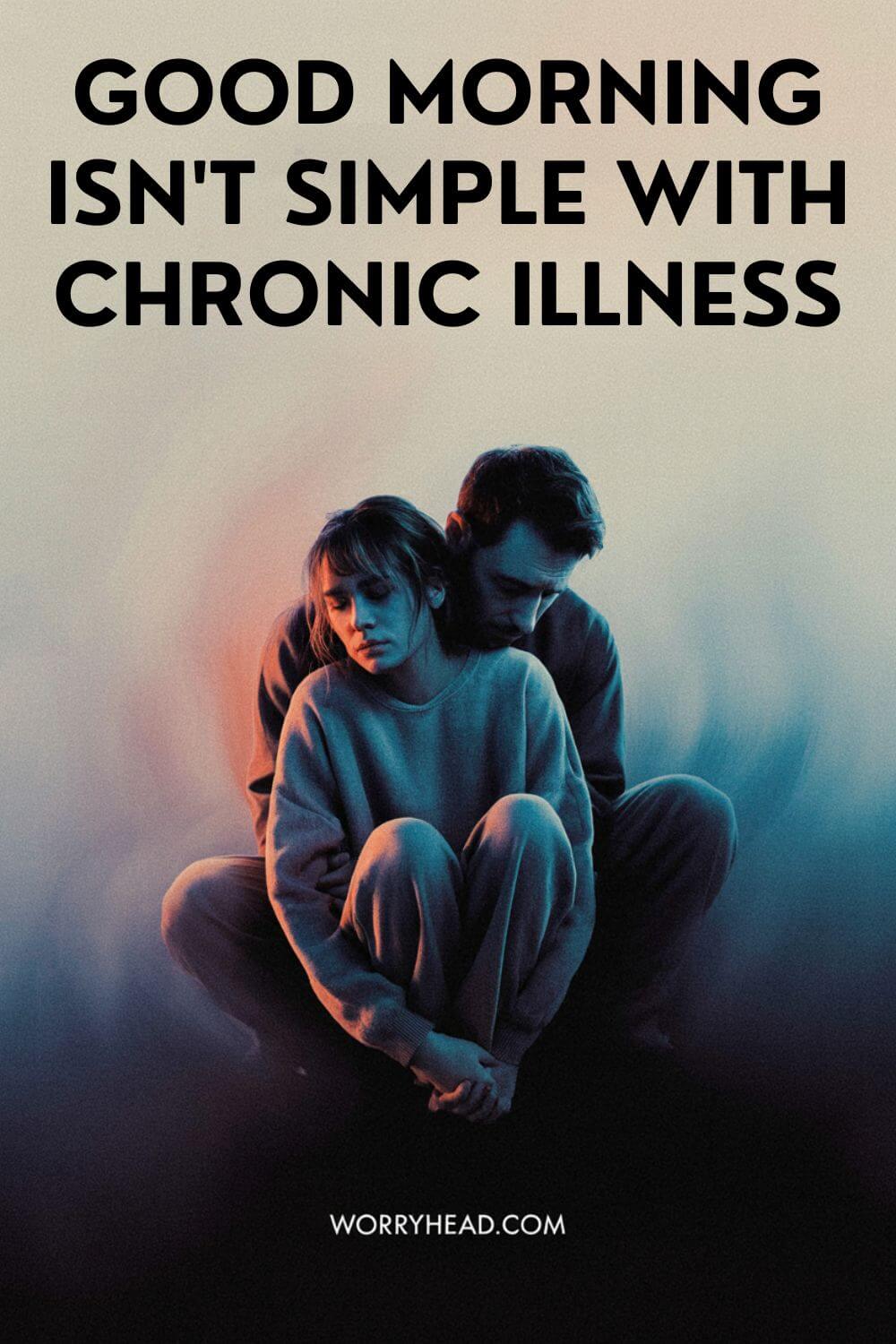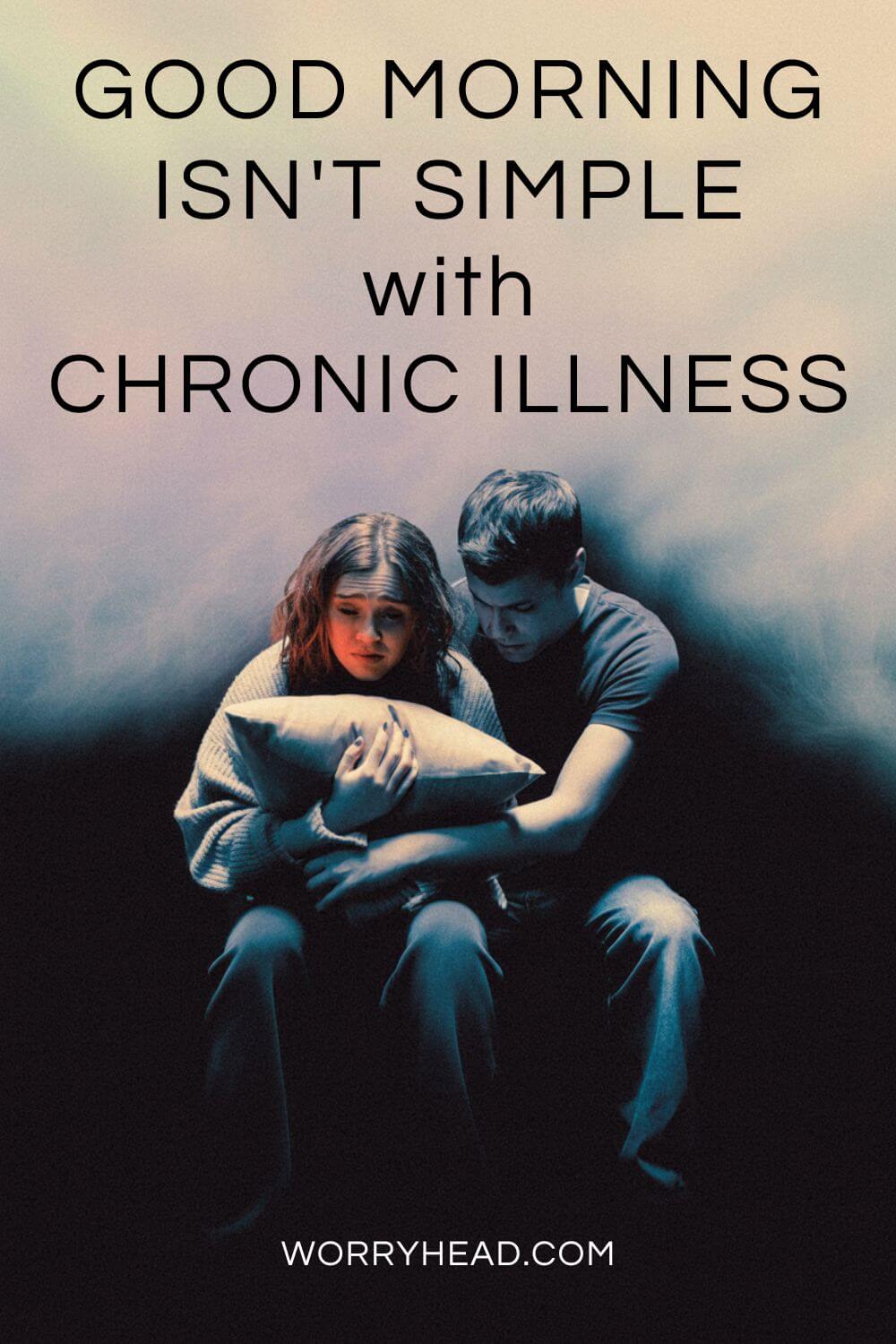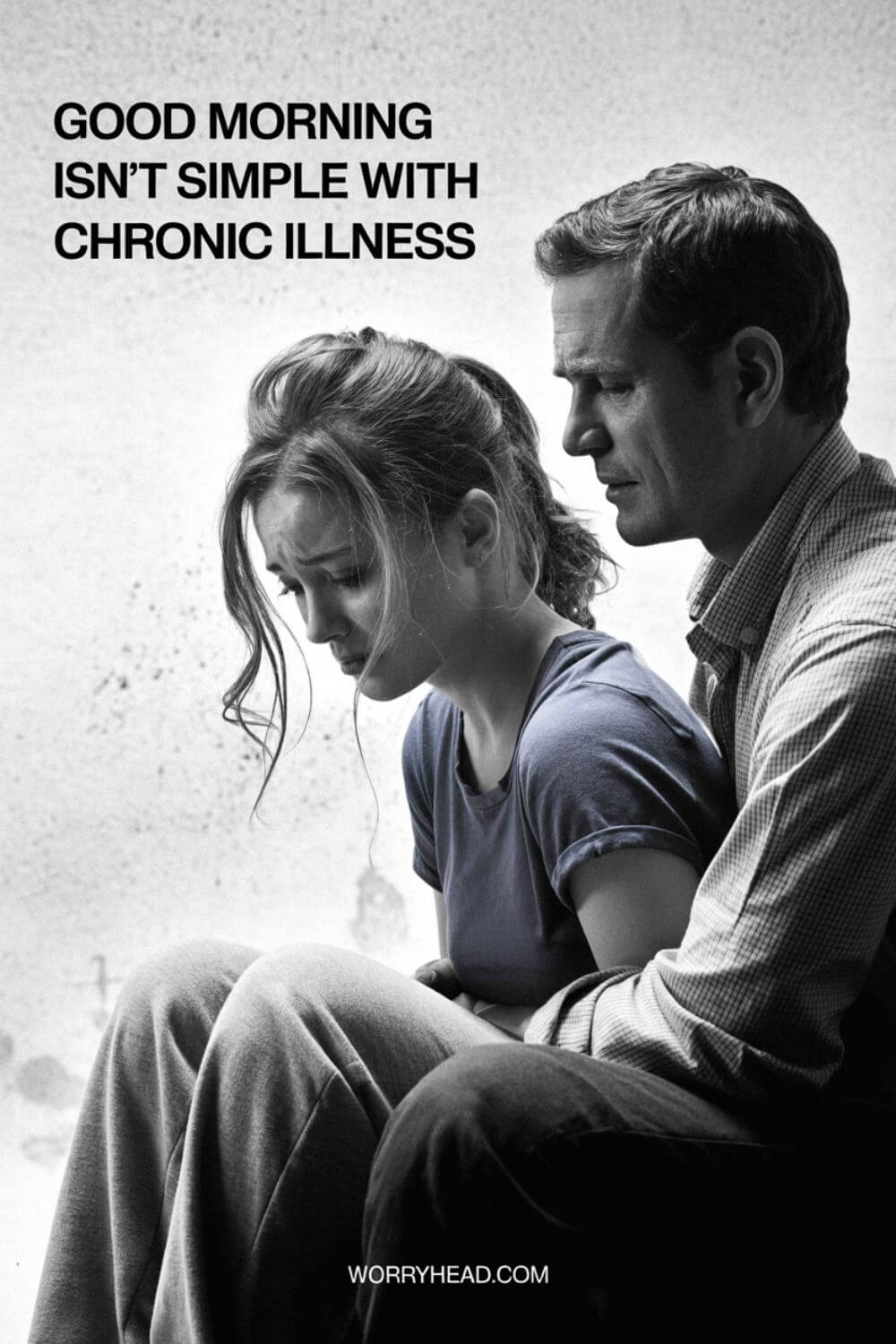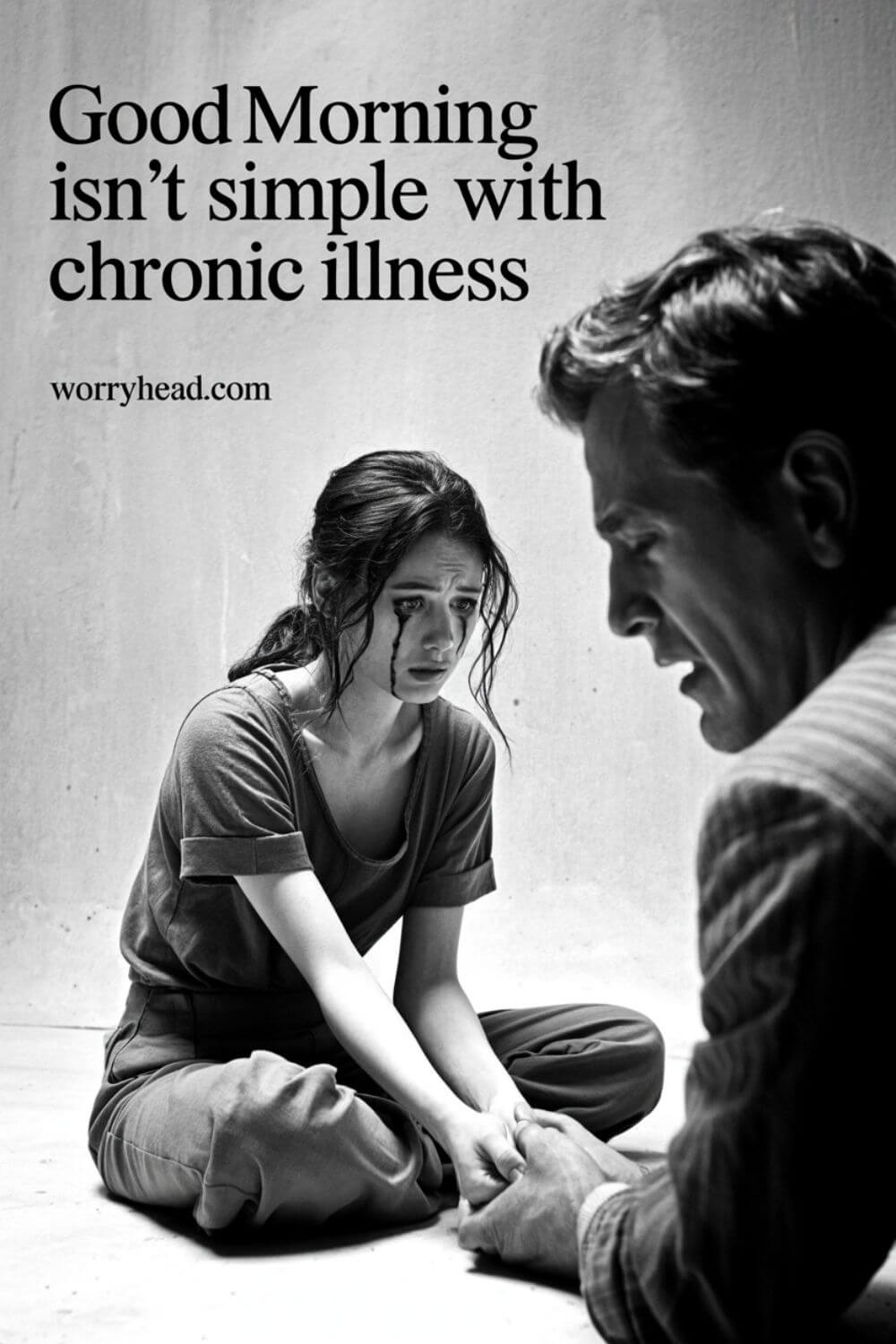Good Morning Isn’t Simple with Chronic Illness
Some days, just getting out of bed feels like climbing a mountain. Good morning isn’t simple with chronic illness, is it? Have you ever woken up so exhausted, so emotionally drained, that even the thought of facing a new day feels unfair, like life has cheated you before you even opened your eyes?
Because when your body is in pain and your mind is heavy, there is nothing “good” about the morning, only the weight of another battle to survive. You don’t just wake up. You brace yourself.
I’ve seen it in my wife’s eyes. That moment when her body has just made it through the night, and she looks at me already defeated, before her feet even touch the floor. It’s in the slow way she sits up, the silent grimace she tries to hide, the heaviness in her breath as she begins another day carrying what most people will never understand.
If you’ve ever felt unseen in your morning struggle, or longed for someone to truly understand what it’s like to start your day in pain, then please, read on…
- Why Good Morning Isn’t Simple with Chronic Illness?
- Why Is Good Morning So Difficult with Chronic Illness?
- How Can You Create a Morning Routine When Good Morning Isn’t Simple with Chronic Illness?
- Rebuilding the Day from a Morning That Started in Pain
- Final Word on Good Morning Isn’t Simple with Chronic Illness
Why Good Morning Isn’t Simple with Chronic Illness?
For most people, a “good morning” starts with energy, maybe a cup of coffee, and a sense of purpose. But good morning isn’t simple with chronic illness because it doesn’t start with energy at all. It starts with fatigue that didn’t disappear overnight, pain that kept clawing through your sleep, and a fog that hangs behind your eyes before they even open.
I’ve watched my wife struggle through mornings that never felt like beginnings.
They felt like continuations of yesterday’s suffering. The alarm clock never brings opportunity; it rings like a cruel reminder that her body isn’t ready, that her soul is already tired, and yet the world keeps demanding more.
- Some mornings she doesn’t say a word.
- Some mornings she cries silently, hiding her face from me.
- Some mornings she pretends to be strong so I won’t worry.
But I see it. I always see it. Because I’ve learned that mornings don’t heal the night before when you’re living with an invisible illness.
The psychological effects of chronic illness are cruel. Waking up doesn’t feel like rest; it feels like the pain simply paused long enough to let fear creep in. Fear of not being productive. Fear of disappointing someone. Fear of becoming a burden again today.
And while most people joke about being “not a morning person,” this is something else entirely. This is chronic fatigue. This is chronic pain. This is the reality of living inside a body that doesn’t recharge overnight.
Sometimes she tells me she’s tired of living with chronic illness.
Not because she wants to give up.
But because she’s exhausted from trying to look normal in a world that doesn’t see her pain.
That’s why I built our life around her, not mine. That’s why I created a way for her to work from home in peace, to wake up slowly, safely, without pressure.
Because mornings shouldn’t be about survival. They should be about possibility. But when you live with chronic illness burnout, possibility can feel like a fairytale.
And if you’ve ever felt that pain or watched someone you love go through it, please know:
- You’re not weak.
- You’re not lazy.
- You’re surviving more than most people ever will.
Because starting your day when your body is screaming at you not to move… That’s courage. That’s a strength. nd you don’t need to prove anything to anyone to deserve love and support.
Mornings changed everything for me. They taught me how to show up as a man.
- To hold space.
- To protect, not fix.
- To soften, not push.
And I think if more people understood how hard it is to say “good morning” when your body’s still stuck in yesterday’s battle, they’d be a little gentler too.
Because for the chronically ill, every morning is sacred. Not simple but sacred.
In the next part, let’s talk more deeply about what happens in those early moments emotionally, physically, and mentally, and why mornings are often the hardest part of the day for someone living with a chronic condition.

Why Is Good Morning So Difficult with Chronic Illness?
When you’re healthy, mornings feel like a chance to start again. But when you’re chronically ill, mornings can feel like the weight of the world pressing down before the day has even begun. Good morning isn’t simple with chronic illness because the body doesn’t reset like it’s supposed to.
There’s no clean slate, just a continuation of symptoms, exhaustion, and fear that today might be worse than yesterday.
For my wife, mornings aren’t peaceful; they’re emotional landmines. The moment her eyes open, she takes inventory:
- Where does it hurt today?
- Will I be able to get out of bed?
- How long until my medication kicks in?
And that’s if she slept at all. Most nights, she doesn’t. Between the pain in her pelvis, the pressure in her joints, the burning fatigue, and the racing anxiety, sleep is rarely restorative. She often wakes more exhausted than when she went to bed.
There’s a psychological burden to this.
It’s not just the physical pain – it’s the mental fight. The moment she wakes, her brain is already overwhelmed by decisions:
- Do I cancel that call?
- Will I disappoint someone again?
- How long can I push myself today before I crash?
And it builds resentment.
Not toward me. Not toward anyone specifically. But toward the body that betrayed her. Toward the life she didn’t choose. That quiet, bitter feeling of being trapped in a cycle of pain that others don’t see, chronic illness resentment is real, and it sneaks into every morning like a shadow.
There are stages of accepting chronic illness, but that doesn’t mean acceptance is linear. Some mornings she’s okay with her limits.
Others… she’s angry. Frustrated. And there are days she just sobs into the pillow, whispering that she’s tired of being strong. That she’s tired of fighting. That she’s tired of being tired.
It breaks me.
But I’ve learned not to fix it. Instead, I sit quietly. I hold her hand. I let her cry.
Because coping with chronic illness and depression isn’t about forcing positivity. It’s about feeling safe enough to break down. It’s about knowing you don’t have to hide your suffering to be loved.
Sometimes, when she can speak through the fog, she says she feels invisible. That even when she smiles, people don’t realize how much effort it takes. The invalidation cuts deeper than the illness itself because what hurts more than pain is being told it isn’t real, or that it’s not “that bad.”
And so, we rebuilt our life around those fragile, early hours.
We made a cozy morning routine that asks nothing of her. We removed alarms. We got rid of expectations. I handle the chaos. She moves slowly. Her needs come first.
Because living with a chronic disease means mourning the version of yourself that used to wake up feeling alive. And no one should have to do that alone.
The chronic illness symptoms may not vanish with the sunrise, but having someone who understands and holds space instead of guilt can change the entire shape of a morning.
If you’re waking up every day feeling like you’ve already lost the fight, please know this:
- You haven’t failed.
- You’re still here.
- You’re doing more than most people ever will.
And if you’re a partner like me, standing beside someone who fights this silent battle… Your presence means more than you’ll ever know.
Next, let’s break down the emotional, mental, and physical challenges of chronic illness mornings into more specific parts so you can see the whole picture of what makes “good morning” such a heavy phrase when illness is involved.

Emotional Weight of Waking Up with Chronic Illness
When you’re living with chronic illness, emotions aren’t something you control; they’re something that controls you. From the second my wife opens her eyes, a silent flood of feelings hits her: fear, sadness, frustration, and that lingering sense of loss. It’s not just the pain, it’s the grief of realizing another day must begin, even though she hasn’t truly rested.
She doesn’t cry every morning, but I can always feel the heaviness in the way she moves or stays still. Sometimes, her silence says more than words ever could.
There’s a deep psychological ache that comes with waking up in a body that doesn’t function, especially when the world expects you to function anyway. That emotional toll compounds daily. It’s not a tantrum. It’s not overreacting. It’s heartbreak, recurring every sunrise.
And for her – and for so many others – it’s exhausting to carry those emotions alone. I’ve learned that one of the most important things I can do is to witness it without trying to fix it. Just holding space in that moment gives her one soft place in a world that feels harsh.
The Physical Reality of Mornings with Pain and Fatigue
You can’t fake your way through morning pain. My wife tries, but I see it in her hands as she pushes herself up in bed. I see it in the way she clenches her jaw just to sit upright. Chronic fatigue isn’t about being “tired.” It’s about waking up more drained than the night before. Chronic pain doesn’t take a break; it simply rearranges itself, showing up in new places and ways every day.
She often says her bones feel like they’re filled with concrete. There’s no bounce, no stretch, no relief. Sometimes, her first movement of the day takes ten minutes of courage. And by the time she gets to the bathroom, she’s already used up all the energy she has for the next few hours.
I watch it all. I hold back tears because it doesn’t seem fair, but she doesn’t need my sorrow. She needs my support. So I boil the kettle. I make her tea. I light the room softly and say nothing that demands energy.
Mental Exhaustion from Constant Internal Battles
Living with chronic illness isn’t just physically hard – it’s mentally brutal. Mornings trigger the worst of it. From the moment she wakes up, she’s calculating:
- What can I do today?
- How will I conserve energy?
- Will I crash again by noon?
It’s a game of emotional Tetris, and it never stops. The guilt of not being able to do “normal things” begins the moment the day starts. That guilt eats away at any sense of peace.
Even worse is the anticipation of invalidation. She’s been told before that she “doesn’t look sick,” or that she “just needs more sleep.” So now, even before speaking, she’s bracing for judgment. That’s not fair. That’s trauma. It rewires your thoughts. It puts you on the defensive, even in your own home. That’s why we designed our mornings to be completely private, no one else’s expectations, no performance, no masks.
Just honesty and softness.
The Loss of Control and Identity in the Early Hours
Before her illness, my wife was a dancer. Movement was her identity. It defined her mornings graceful stretches, routines that awakened her soul. Now, mornings are about managing inflammation, dizziness, and the dread of how long it will take for her medication to kick in. This shift didn’t just affect her body; it stole parts of who she believed she was.
And that grief hits hardest in the quiet of morning.
She’s told me she doesn’t recognize herself sometimes. The woman who could leap across a stage now struggles to walk to the kitchen. That loss is not something time fixes. It becomes part of your identity, woven into the way you wake up, the way you breathe, the way you hope.
Supporting someone through this kind of identity shift takes more than patience; it takes love that doesn’t flinch. That’s what I try to give her every morning. A reflection of who she still is, even in her slowest moments.
Anxiety and Panic Before the Day Has Even Begun
Anxiety and chronic illness are cruel companions. Mornings often bring panic before anything has even happened. It starts in her chest—tight, shaky breaths. Sometimes it’s because of the nightmares. Sometimes it’s because of the unpredictable nature of her pain. Sometimes it’s simply the fear of having to try again. The what-ifs creep in:
- What if today is worse?
- What if I fail again?
- What if I can’t show up?
Panic attacks don’t wait for a convenient time. I’ve held her through them at 7 a.m., whispering, “You’re safe. You don’t have to do anything today.” But the truth is, the world doesn’t stop. Work, responsibilities, and bills continue. That’s why I built our life to allow her to pause without falling behind.
Why do I work from home? Why do I blog? Because anxiety isn’t something you “snap out of.” It’s something you learn to live with compassion.
Now that we’ve seen how the emotional, physical, and mental toll of mornings manifests, let’s talk about how I’ve intentionally redesigned our home life, our income, and our daily rhythms to honour those early hours without compromise.

How Can You Create a Morning Routine When Good Morning Isn’t Simple with Chronic Illness?
I never thought I’d become the kind of man who tiptoes around the kitchen at dawn so my wife doesn’t wake up too soon. But when good morning isn’t simple with chronic illness, you begin to understand that a routine isn’t about productivity, it’s about protection.
Not just of her body, but her spirit.
A chronic illness morning routine isn’t designed to get things done. It’s designed to keep the world gentle long enough for healing to be possible.
Because when the sun rises, her body doesn’t. When the light enters the room, it doesn’t bring clarity; it brings pressure. When the world says, “Get up,” her illness says, “Not yet.”
So instead of forcing her into someone else’s rhythm, I created space for her to wake into her own. A rhythm of stillness. Of safety. Of no judgment.
We’ve learned the hard way that trying to mimic a “normal” morning only leads to more pain, both physical and emotional. So we flipped the idea of mornings entirely. We made them sacred. Slow. Custom-built for her nervous system.
I often light a candle in the corner of our bedroom before she opens her eyes.
I bring warm water with lemon or a cup of gentle tea to her bedside. Not because she expects it but because I want the first thing she feels to be ease, not urgency. Because anxiety and chronic illness are already raging through her before her feet even touch the ground.
There’s no alarm clock in our home. No “get up and go.” Instead, there’s a quiet kind of care. And that matters because for someone battling chronic fatigue and chronic illness syndrome, even blinking can feel like an effort. And when everything feels like a task, love shows up in the smallest, softest ways.
We chose to build a life around this rhythm.
That’s why I started blogging. That’s why I built my home office around her needs, not mine. That’s why we earn from home, together. Because when I say I want her to feel safe, I don’t mean emotionally safe only. I mean financially. Physically. Mentally. Because for someone living with chronic illness, peace is often the most powerful medicine.
There are days she still crashes, even with all this care.
But now, she knows she’s allowed to. And in that knowing, she begins to heal not because her illness is gone, but because she’s no longer fighting the guilt of simply existing in her body.
When your partner suffers from something invisible, your love has to become visible. And this is how I make mine every single morning.
Next, let me show you what it really takes to build this kind of supportive routine step by step, emotionally, practically, and relationally. Because designing a morning around chronic illness isn’t just kind… It’s transformative.

Remove the Pressure to “Start the Day Right”
The phrase “start the day right” can feel like a slap in the face when you’re chronically ill.
Society tells us mornings are for productivity, hustle, and getting ahead. But when your body feels like it’s been hit by a truck, that expectation becomes a form of violence. That’s why I completely removed that pressure from our home. My wife doesn’t need to jump into emails, phone calls, or housework by 9 a.m. She needs gentleness. She needs space to just be.
I don’t ask her, “What’s the plan today?” I ask her, “What do you need right now?”
That shift alone changes everything. It’s permission to honor how she feels, not how she thinks she’s supposed to feel. And it’s how we began to undo years of internalized guilt. When she wakes up slowly and quietly, without a to-do list waiting for her, I can see a flicker of peace in her.
And that flicker? That’s what we protect with everything we’ve built.
Design the Morning Environment for Comfort
We redesigned our bedroom into a sanctuary, not a space to sleep and dash from, but a space to heal. Soft curtains to block harsh morning light, warm neutral tones to ease anxiety, essential oils diffusing gently, and no visual clutter.
These details matter more than people think. When you live with an invisible illness, overstimulation can send your nervous system into panic mode before you’ve even stood up.
I added a heated blanket to her side of the bed for painful flare-ups. We replaced her bedside table with a soft-lit lamp and calming items like books and a journal. Her favorite mug sits nearby for the tea I bring each morning. The room says: You are safe here. That alone slows her heart rate. It’s not about aesthetic trends. It’s about building emotional safety into every physical object she interacts with, the second she wakes up.
Create Emotional Safety Before Movement
Chronic illness and trauma are tightly linked. And that trauma often flares before the body does. So I’ve learned that emotional safety must come before movement. Before getting out of bed, I speak softly. I ask if she wants to cuddle or if she needs space. I validate her feelings even if she hasn’t voiced them. Because I know they’re there. The frustration. The fear. The grief of another hard morning.
Sometimes she tells me she feels like a burden. That she wishes she could just “get up and go.” That she hates what this illness has done to her independence. I remind her gently, consistently, that she’s not a burden. Her experience is valid. Her limits are real. And her value isn’t tied to how fast she can move.
Emotional safety isn’t built with big declarations; it’s built through repetition. Through quiet love, daily, without conditions.
Allow the Body to Guide the Pace
One of the biggest lies chronic illness teaches is that your body is the enemy. But it’s not. It’s just screaming for help in the only way it knows how, through pain, through fatigue, through resistance. So we let her body decide how the morning flows. Some days she lies in bed until 11 a.m. Other days she gets up earlier, walks to the kitchen, and sits by the window. But the key is she decides.
I don’t push her. I don’t time her. I don’t comment on her pace. That freedom alone helps her listen to her body with more compassion. And when she’s not battling herself internally, she actually feels better.
Her nervous system settles. Her breathing slows. And even though she may still be in pain, she’s not fighting it alone. Giving someone permission to honor their own pace is one of the most loving things you can do. Especially when that person has spent years apologizing for being slow.
Incorporate Gentle Rituals That Bring Peace
Our mornings now include rituals that soothe rather than stimulate. A warm herbal tea. Gentle instrumental music or birdsong. Sometimes, soft affirmations played in the background. Other times, silence. We might stretch together slowly, or sit in stillness with her head on my shoulder.
These moments don’t change her diagnosis, but they transform the way she experiences it. They help her feel held, not just by me, but by the environment we created together.
These rituals are not tasks to check off; they’re offerings. Offerings to her nervous system, her aching body, her grieving soul. They remind her that she is worthy of care, not because she’s productive or upbeat but simply because she exists. And they remind me, too, that being a partner means learning to love someone exactly as they are, not as the world expects them to be.
Now that we’ve created a nurturing environment around her mornings, let’s talk more about how that love carries forward into the rest of the day and why honoring the slowness of a chronic illness morning leads to deeper connection, resilience, and even joy later on.

Rebuilding the Day from a Morning That Started in Pain
When good morning isn’t simple with chronic illness, it doesn’t mean the rest of the day is doomed, but it does mean we have to approach it with intentional care. I’ve learned over the years that how the day starts shapes everything that follows. So if it starts with fear, pain, or exhaustion… then we don’t “push through” – we respond with grace.
This is the part of our life that required the biggest shift, not in our schedule, but in our mindset. I stopped expecting her to match the pace of a world that has no clue what it means to wake up in a body that betrays you. I started pacing the world around her instead. And in doing that, we started reclaiming life, not just surviving it.
The psychological effects of chronic illness don’t vanish after breakfast. They linger. They show up in quiet self-doubt, in internalized guilt, in the fear of being seen as lazy or unreliable. And I refuse to let her carry that alone.
That’s why everything about our home life – our work, our goals, even our dreams – revolves around compassion first.
She doesn’t “get ready” for the day. She warms up to it. She doesn’t go from zero to 100. She moves from pain to presence, at her own speed. Some days, she needs two hours of stillness before she even speaks. Some days she’s able to write, create, or take on a task. But it always starts with me asking: “How are you really feeling?” And meaning it.
When she feels heard, she softens. When she feels safe, she blooms—even in pain.
That’s why I work from home. That’s why I built multiple blogs. That’s why I taught myself how to earn without chaining us to anyone else’s clock. Because her healing is not a side note in our lives. It’s the foundation.
We’ve had days where she cried in the morning… and laughed by sunset. That wouldn’t happen if we treated her mornings like failures. But when you honor the slow, you unlock the possibility of peace later.
Chronic illness doesn’t disappear.
But it doesn’t have to steal everything, either.
And let me tell you this as a man watching the woman he loves fight battles no one sees, especially when you build a life around compassion, not comparison, you make room for joy in places you never imagined.
Sometimes, it’s a moment by the window with a warm cup of tea. Sometimes, it’s her writing a sentence she didn’t think she had the energy to write. Sometimes, it’s her saying, “I feel okay right now,” and that’s more powerful than any milestone the world celebrates.
This rhythm, the one we live by, didn’t come from a book. It came from pain. From patience. From real-life trial and error.
And if you’re in that place right now, trying to rebuild a day that began in agony, just know:
- You’re not broken.
- You’re not failing.
- You’re figuring it out – and that’s sacred.
Next, let’s explore how these gentle, intentional choices echo through the rest of the day. I’ll walk you through the small but powerful anchors that keep her grounded when the world outside doesn’t slow down, even when her body needs it most.

Midday Energy Crashes and How We Adapt
By the time noon rolls around, my wife is often already depleted. Even on her best days, the energy she uses just to “wake up” is equivalent to someone else running a marathon. That’s why midday crashes aren’t just occasional, they’re expected. We plan around them. We don’t fight them. Because trying to push through only leads to deeper chronic illness burnout.
So when her body gives in, whether it’s fatigue, dizziness, or full-body aching – we pause. No guilt. No shame. I take over anything urgent.
She rests in silence, sometimes for hours. And if she’s feeling emotionally fragile, I stay nearby without talking, just being there. Her rest isn’t a break. It’s survival. And knowing that helps her let go of the guilt and lean into the softness of what her body actually needs.
Using Rest as a Tool, Not a Reward
It took us years to unlearn that rest must be earned. In chronic illness life, rest is not a luxury – it’s medicine. We no longer treat it as a reward after hard work. It’s a built-in part of her day, no matter what she did or didn’t do. Sometimes she naps. Other times she just lays still, listens to soft music, or stares out the window. This “doing nothing” isn’t laziness. It’s a regulation. It’s preservation.
When her nervous system has been in survival mode all morning, rest is what brings her back to herself. It also helps avoid flares later in the day. So we guard that rest fiercely. I schedule my own work around it. I keep the house quiet. I don’t interrupt her. Because her body had to stop, and it took both of us time to accept that without apology.
Gentle Productivity on Her Terms
There are days she feels a little strength in the afternoon. And we honor that – gently. She might respond to one email, organize something small, write a paragraph of a blog post, or fold a few clothes. But it’s always on her terms.
No pressure. No comparison. The goal is not productivity. The goal is connection to herself, to a purpose, to a spark of capability that reminds her she’s still here.
I learned quickly that telling her to “rest all day” wasn’t always helpful. She doesn’t want to feel useless; she wants to feel engaged. So we created small “wins” that feel satisfying without exhausting her. And when she completes one of those, I make sure to recognize it not with praise, but with presence. Just a smile. A kiss. A quiet, “I saw that.” Because that’s enough.
Navigating Chronic Illness Invalidation from Others
Afternoons are often when messages or calls from the outside world creep in, work reminders, friends’ texts, and doctors’ emails. And with them comes the threat of invalidation. Someone might casually ask, “Are you still unwell?” or expect a task to be done quickly, forgetting the context she lives in. It’s subtle, but it stings. She feels dismissed. Invisible.
That’s when I step in not to shield her, but to stand beside her. I help her craft responses. I advocate when needed. I remind her that her boundaries are valid and her pace is not a flaw. Over time, this has helped her build confidence in saying “no” or “not today” without guilt. But it’s a process. And I stay in it with her every step.
Late-Day Emotional Waves and Grounding Routines
Evenings bring another wave of emotions. Sometimes sadness, sometimes irritability, sometimes pure grief that another day passed, mostly in survival mode. And honestly? Sometimes she feels nothing at all, just numb. This is common for people living with chronic illness. You go through so much just to get through the day that by sunset, you’re emotionally hollow.
So we created grounding routines. Dimmed lights. A warm bath. A shared meal, even if simple. We don’t fill the space with noise or plans. We create room to feel whatever needs to come up. Whether it’s tears or laughter, we let it flow. And I stay close not to fix, but to hold. Because her evening calm isn’t automatic. It’s something we build together.
Finding Joy in the Smallest Wins
We celebrate things others overlook. If she walks to the mailbox, we smile. If she makes it through the day without a panic attack, we hug. If she laughs even once, it’s a victory. These moments matter because they’re hard-earned. Chronic illness doesn’t steal her ability to feel joy. It just hides it behind layers of exhaustion and pain. But when joy breaks through… It’s the purest thing in the world.
We’ve learned to look for beauty in the cracks of the day. A soft breeze. A warm meal. A small dance in the kitchen when her legs allow it. These tiny sparks keep us going. And they’re more than enough. Because when joy comes from survival, it means more than anything comfort alone could bring.
Evening Reflections and Soft Connection
Our nights always end the same way together, side by side, reflecting softly on how the day unfolded. Not with goals or critique. Just with presence. Sometimes she talks. Sometimes she doesn’t. Sometimes I tell her stories from my past to help her drift into sleep with something gentle in her mind. It’s sacred time.
We don’t rehash what went wrong. We simply notice what was. I remind her she did enough. That she is enough. And even if her body felt like a battlefield, her soul made it through. She falls asleep knowing she is safe, loved, and never alone. That is our definition of success.
In the final section, I’ll bring everything together from pain-filled mornings to tender nights—and remind you why supporting someone through chronic illness isn’t just about love… It’s about transforming what life looks like when “good morning” is anything but simple.

Final Word on Good Morning Isn’t Simple with Chronic Illness
If there’s one truth I’ve come to understand deeply over the years, it’s this: good morning isn’t simple with chronic illness, and that’s okay. The world may run on fast starts, early alarms, and a relentless chase for productivity, but when your body is fighting a quiet war every single day, that rhythm doesn’t fit. It never will. And trying to force it only leads to more pain, more guilt, and more emotional isolation.
I’ve watched my wife wake up in agony more times than I can count. I’ve seen the silent tears she hides in the early light. I’ve held her as she panics without knowing why. I’ve heard her whisper, “I’m sorry I’m not better.” And every time, I’ve told her, “You don’t have to be better – you just have to be.”
The psychological effects of chronic illness are devastating, not just because of the illness itself but because of how lonely it makes people feel in a world that expects strength 24/7. My wife never chose to live with endometriosis, fibromyalgia, or the mental toll they carry, yet she wakes up every day and tries again. That alone deserves more recognition than most people will ever give.
And that’s why I built this life the way I did.
I wanted her mornings to feel like hers, not dictated by a job, society, or impossible expectations. I didn’t want her dragging herself to a 9-to-5, pretending she was okay when she wasn’t. I didn’t want her to suffer silently while the world called her lazy, dramatic, or weak.
I wanted her to wake up in safety, in comfort, in love.
- So I built blogs.
- I created an online income.
- I designed our home office around her needs, not mine.
- And most importantly, I listened to what she needed, to what hurt, to what healed.
This blog, this message, this life, it’s not about me.
It’s about what happens when a man decides to stand beside a chronically ill woman and say, “You don’t have to do this alone.”
It’s about rewriting the story of what mornings can be, not rushed, not forced, but tender, slow, and sacred.
If you’re chronically ill and waking up each day with dread in your chest, please know:
- You are not lazy.
- You are not broken.
- You are surviving something invisible and cruel and still finding ways to love, laugh, and carry on.
And if you’re a partner reading this, trying to understand how to help – start with this: slow down.
- Make her feel safe before she even opens her eyes.
- Remove the expectations.
- Replace them with presence.
- Understand that some of the greatest acts of love are quiet, patient, and repeated every single morning.
Because yes – good morning isn’t simple with chronic illness. But with love, with intention, and with deep understanding… it can still be beautiful.
You don’t have to wake up full of energy to be worthy of love. You don’t have to be pain-free to deserve peace. And you don’t have to explain yourself to a world that doesn’t understand – because here, you’re understood. You’re valued. You’re seen.
If this touched you, I invite you to leave a comment below and share your morning story and don’t forget to download a FREE chapter of my deeply personal eBook, written from the heart for women like you.


About Me
Hi, I’m Lucjan! The reason why I decided to create this blog was my beautiful wife, who experienced a lot of pain in life, but also the lack of information about endometriosis and fibromyalgia for men…
READ MORE